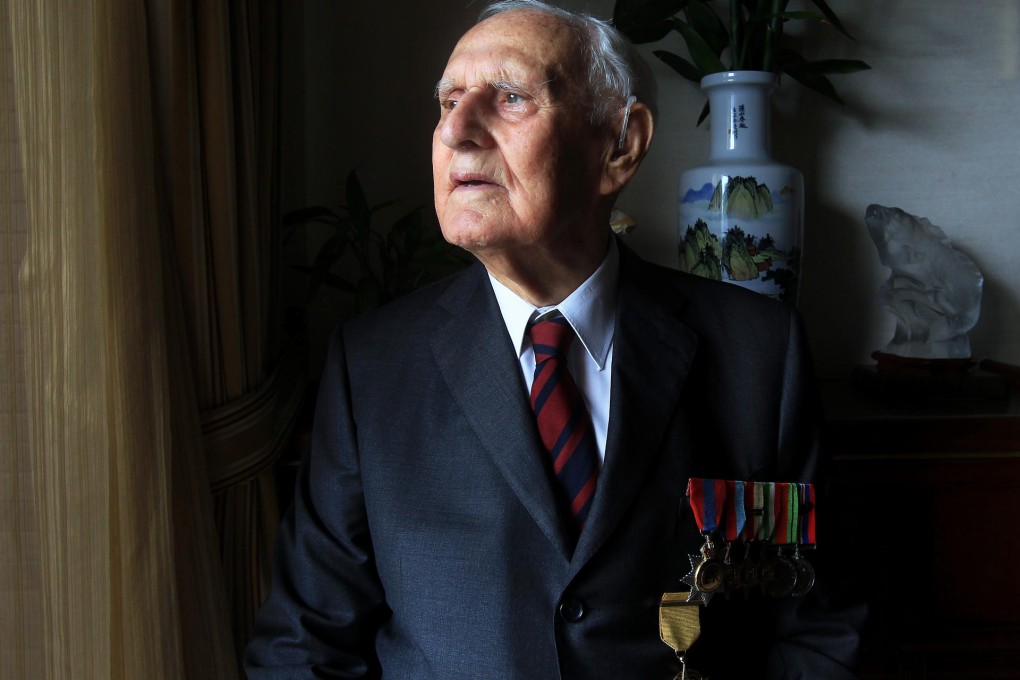60 years a Hongkonger: Dan Waters on the second world war, karate kicks and mixed-marriages
The nonagenarian, author and second world war veteran, who became a marathon runner in his 60s, tells Jenni Marsh that he sailed into Hong Kong in 1954 and never looked back

F I was born in Norwich. It's the largest city in the county of Norfolk, in England. I stayed there for a few days then my family moved to a market town where my great-grandfather had set up a construction firm in 1853. I eventually took it over - fourth generation to do so. When the second world war broke out, I fought with (Lieutenant-General Bernard) Montgomery in the Western Desert, in North Africa. I'm talking about the second battle of El Alamein, against the Italians and the Germans. After the war, I didn't know what to do for the rest of my life. I applied for the Colonial Service (the British government department that administered its overseas affairs). I saw an advert in The Times newspaper and went for an interview in London. I was applying to go to Trinidad but my interviewer (Sir Christopher Cox) said, "Waters, with your construction experience, you'd be more suited to Hong Kong." In the autumn of 1954, I sold the family company and wrote back to Cox and said, "Yes."
It took 31 days to sail here. I'd been on troop ships - out from Liverpool, around the Cape of Good Hope and up the other side of Egypt - but I enjoyed the voyage out here much more. Initially, I wasn't impressed with Hong Kong, to be truthful. There were no spic and span buildings. But I got used to it. I joined Hong Kong's Royal Asiatic Society and became interested in Chinese culture - that swayed me towards marrying a Chinese woman. I hadn't been here long when I met Vera. I was working at the old Technical College - a red brick, literally, all the bricks it was built with had been shipped from England - as a senior lecturer in building. Vera was a mature student, but I never taught her. We were married at St Anthony's Church on April 21 - the queen's real birthday, a bank holiday - in 1960. My wife's father had been against the idea, but he died a year before. At the college, the principal said I'd let the side down by marrying a Chinese; that was the general feeling. Some people I would have invited to our wedding, I didn't, because I knew they wouldn't come. But we were married and it was photographed in the SCMP. That afternoon we were invited to the garden party for the queen's birthday at Government House. That was really something. Colleagues didn't want anything to do with us, but there was the governor (Robert Brown Black) inviting us to the birthday party!
I enjoyed being part of the colonial system and I made quite a name for myself. In 1968, I became the first principal of the Morrison Hill Technical Institute. I was there until 1972, when I joined the Education Department, where I was made assistant director of education. I set up five technical institutes and set the pattern for technical education in Hong Kong. In 1980, I retired and did a PhD in technical education part-time at Loughborough University. I went back to Britain for three months to study. Vera stayed in Hong Kong. She was working at Chartered Bank at that time, and starting up her own skincare business, Nu Skin, which is her main job now. She's quite a bit younger than I am, you see; she'll be 79 this month. We've seen a lot together in Hong Kong. I remember when the Tiananmen Square protests happened in 1989, Vera was crying and saying, "What are we going to do?" She was afraid there'd be trouble here. I said, "You needn't worry." I was right. When the handover came, in 1997, a lot of Westerners with Chinese wives, like me, decided to stay on. I was sorry but I realised it had to happen. We couldn't carry on as a colony.
I became a black belt in karate aged 57. Then, aged 62, I started to run marathons. The Macau Marathon was my first. I was always the oldest person running. Now I'm 94, and I've given up all that - the angina - but every morning, I go out on my balcony and do exercises. I'm in reasonable shape now, but in the 1990s, I had to go for an X-ray. The chap at the hospital came back with a terribly puzzled face. He said, "Do you realise there are pieces of metal in your body?" It was shrapnel left over from an accident during the war.
Our family is one of writers. My son (from a previous marriage in Britain) was a journalist when he left Cambridge University. My sister [Olga Sinclair, who died last year] wrote about 30 books, mostly novels, and my aunt writes, too, though not so successfully. I co-authored a three-volume series, Understanding Technical English. Dry subject, but volume one shifted one million copies. One Couple, Two Cultures was a book I'd always wanted to write, but it didn't come out until 2005. I interviewed 80 or so mixed couples on their relationships; some friends refused to take part, they felt it was "none of your business". One review in the Journal of the Royal Asiatic Society didn't like the chapter title "One couple, two kitchens". A lot has been written on Indians and Africans marrying Europeans, but not Chinese. Such marriages are bound to multiply, and I believe that'll have a stabilising effect on society. It breaks down cultural barriers.